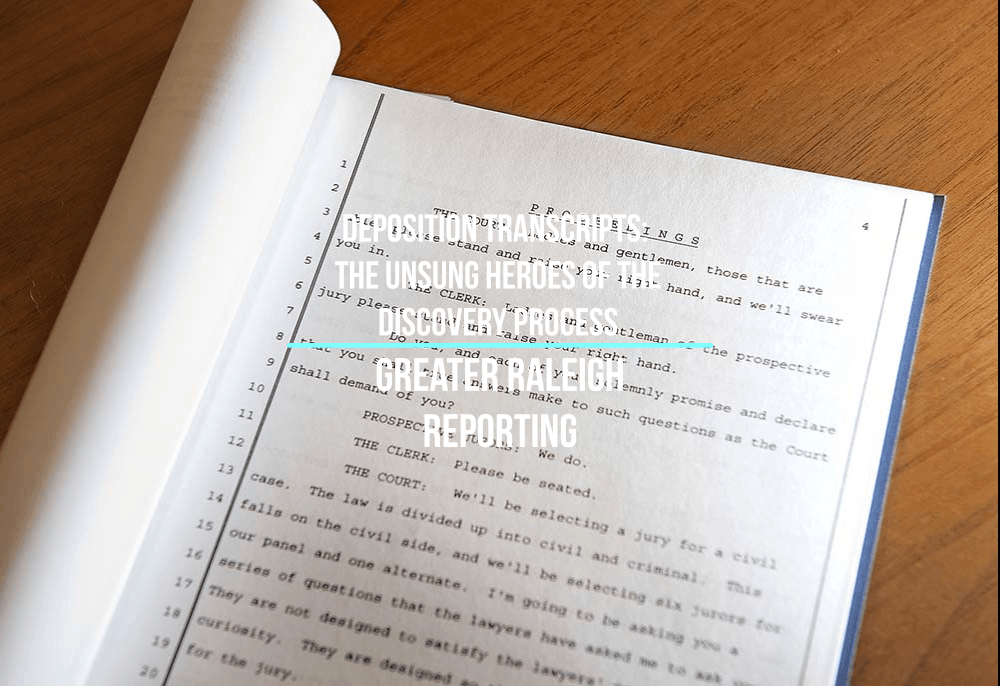Month: May 2023
The Olympics of Court Reporting

Depositions are a crucial part of the discovery process in litigation, providing an opportunity to gather sworn testimony and assess witness credibility. Traditionally, depositions have been conducted through a written transcript. However, with advancements, video depositions have gained popularity in the legal field. In this article, we will explore the advantages of video depositions over regular depositions and why you may want to consider utilizing video for your next deposition.
1. Enhanced Non-Verbal Communication:
One of the primary benefits of video depositions is the ability to capture and analyze non-verbal communication. Facial expressions, body language, tone of voice, and overall demeanor can provide valuable insights into a witness’s credibility and emotions. Video allows for a more accurate representation of the witness’s demeanor, helping attorneys evaluate their truthfulness and make informed decisions.
2. Visual Impact:
Video depositions can have a more significant visual impact compared to a written transcript. Attorneys can use visuals, such as exhibits, charts, or diagrams, to support their questions and illustrate complex concepts. Visual aids can enhance understanding, engage the viewer, and make a lasting impression on jurors during trial.
3. Preserving Witness Testimony:
Video depositions serve as a comprehensive and accurate record of the witness’s testimony. Unlike written transcripts, video captures nuances, inflections, and pauses in the witness’s speech, providing a more complete representation of their statements. This preservation of the witness’s exact testimony can be invaluable during trial preparation, cross-examination, and presenting evidence to the court.
4. Remote Accessibility:
Video depositions offer the convenience of remote accessibility. Attorneys can conduct depositions with witnesses who are unable to be physically present, whether due to distance, health reasons, or scheduling conflicts. This flexibility allows for the timely completion of depositions, saving time and resources.
5. Improved Juror Engagement:
During trial, video clips from depositions can be utilized to engage and educate jurors. By presenting compelling video excerpts, attorneys can humanize witnesses, bring their testimony to life, and make a more persuasive case. Video has a unique ability to captivate and hold the attention of jurors, increasing the likelihood of understanding and retention.
6. Effective Cross-Examination Tool:
Video depositions provide a valuable tool for effective cross-examination. Attorneys can replay specific segments of a witness’s testimony, challenging inconsistencies or contradictions in real-time. By presenting conflicting statements captured on video, attorneys can impeach the witness’s credibility and strengthen their case.
7. Deposing Expert Witnesses:
Video depositions are particularly beneficial when deposing expert witnesses. Experts often rely on visual aids, charts, or simulations to explain complex concepts. By recording their deposition testimony, attorneys can capture not only the expert’s words but also their visual demonstrations, creating a more comprehensive record.
While traditional written transcripts have long been the norm for depositions, the advantages of video depositions are becoming increasingly apparent. Video depositions offer enhanced non-verbal communication, visual impact, remote accessibility, preserved witness testimony, improved juror engagement, effective cross-examination tools, and benefits specific to expert witnesses. By considering the power of video depositions, attorneys can leverage this valuable tool to enhance their advocacy, strengthen their case, and effectively communicate their narrative to judges and jurors.
The Olympics of Court Reporting

In the world of law, the discovery process is a critical phase that allows parties involved in a legal case to obtain information, facts, and evidence from each other. This process enables attorneys to delve deep into the details of a case, uncover crucial evidence, and build a strong legal strategy. Among the various tools used during discovery, deposition transcripts stand out as the unsung heroes that play a pivotal role in the pursuit of justice.
A deposition is a formal out-of-court testimony given by a witness or a party to a lawsuit. During a deposition, attorneys have the opportunity to ask questions, cross-examine witnesses, and gather valuable information under oath. A court reporter is present to record every word spoken, ensuring an accurate and reliable transcript of the deposition.
Deposition transcripts serve as a treasure trove of information for attorneys and can be incredibly beneficial for several reasons. Firstly, they provide attorneys with a detailed account of witness testimonies. Witnesses are often the key to unraveling the truth, and deposition transcripts allow attorneys to carefully analyze their statements, identify inconsistencies, and strategize accordingly.
These transcripts are particularly valuable when witnesses are unable to appear in court during trial. Circumstances such as health issues, relocation, or unavailability may prevent witnesses from attending the trial. In such cases, deposition transcripts become the primary means through which witnesses’ testimonies can be presented to the court. This preserves the evidence, ensures a fair trial, and allows the judge and jury to consider the full scope of witness statements.
Deposition transcripts also serve as a powerful tool for impeachment. If a witness contradicts their deposition testimony during trial, the attorney opposing them can confront them with their prior statements. By presenting the deposition transcript as evidence, attorneys can effectively challenge the credibility of the witness and cast doubt on their current testimony. This can be a game-changer in the courtroom, significantly impacting the outcome of a case.
Moreover, deposition transcripts allow attorneys to thoroughly prepare for trial. By carefully reviewing the transcripts, attorneys can identify potential weaknesses in their case, anticipate the opposing counsel’s arguments, and develop effective cross-examination strategies. These transcripts provide attorneys with a comprehensive understanding of the case, allowing them to present their arguments convincingly and counter the opposing party’s claims effectively.
Additionally, deposition transcripts are invaluable for preserving the record. Court reporters meticulously transcribe every word spoken during a deposition, creating an accurate and verbatim account of the proceedings. These transcripts become a permanent record of the case, ensuring that important details and testimony are not lost over time. This is especially crucial in complex cases with numerous witnesses and extensive factual information.
In recent years, technological advancements have further enhanced the value of deposition transcripts. With the advent of electronic transcripts, attorneys can quickly search and reference specific sections of the deposition, making their review process more efficient. They can easily highlight and annotate important passages, allowing for better organization and analysis of the information.
In conclusion, deposition transcripts are the unsung heroes of the discovery process. These comprehensive records of witness testimonies provide attorneys with crucial information, aid in trial preparation, impeach witnesses, and preserve the record for future reference. Their importance cannot be overstated, as they play a vital role in ensuring a fair and just legal system. As technology continues to advance, the use of deposition transcripts will only become more streamlined and indispensable, solidifying their status as a cornerstone of the legal profession.